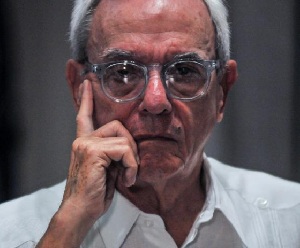 Eusebio Leal used to say that many, even the women who accompanied him along the way, fell in love with a character. But when the night came and he took off his gray suit, and fell into bed, drained by the daily struggle, disappointment in the real, ordinary person ensued.
Eusebio Leal used to say that many, even the women who accompanied him along the way, fell in love with a character. But when the night came and he took off his gray suit, and fell into bed, drained by the daily struggle, disappointment in the real, ordinary person ensued.
When do men stop being simple mortals to become legendary beings? Does the mythical figure appear to us irremediably divorced from the human one that preceded it in time? How healthy is it to choose one side and reject the other?
These ideas haunt me today, at a time when the Havana City Historian would have reached his 78th birthday. And such questions have much to do with the mania of some biographers of great figures in history, of offering an immaculate profile that does nothing but separate the bird’s two wings.
Eusebio was a Cuban man of his time who created himself, at the cost of sweat and sacrifice. A self-taught man who overcame difficult challenges and more than a few obstacles to see his dreams come true. He was a young patriot fascinated by the history and the island’s ideal of freedom, who proposed to magnify that heritage with his work at the service of the nation.
He had defects, no doubt, and he neglected his personal life to defend the utopia in which he courageously believed. But none of this takes away from the fact that he was an enlightened being, a unique creature that lived his life among cobblestones, cannons, flags and machetes.
Because he believed in the value of symbols and, like an armed dove, he defended everything related to our moral greatness, to the Cuban ethics by which we would like to live, so beautifully described by Cintio Vitier in Ese sol del mundo moral (That sun of the moral world).
Today, barely a month after his physical departure, apart from making a lasting ritual of the beautiful spontaneous gesture of hanging white sheets from balconies, the best tribute we can pay Eusebio Leal is to delve into his life with our heads uncovered, as he hoped we would in the case of our forefathers, accepting them as they were, without denying their contradictions or defects.
Only in this way, those who did not live in his times, those who will know him only in bronze or marble, will be able to feel the reverberation of an extraordinary man, but one of flesh and blood.
(Source: Granma)